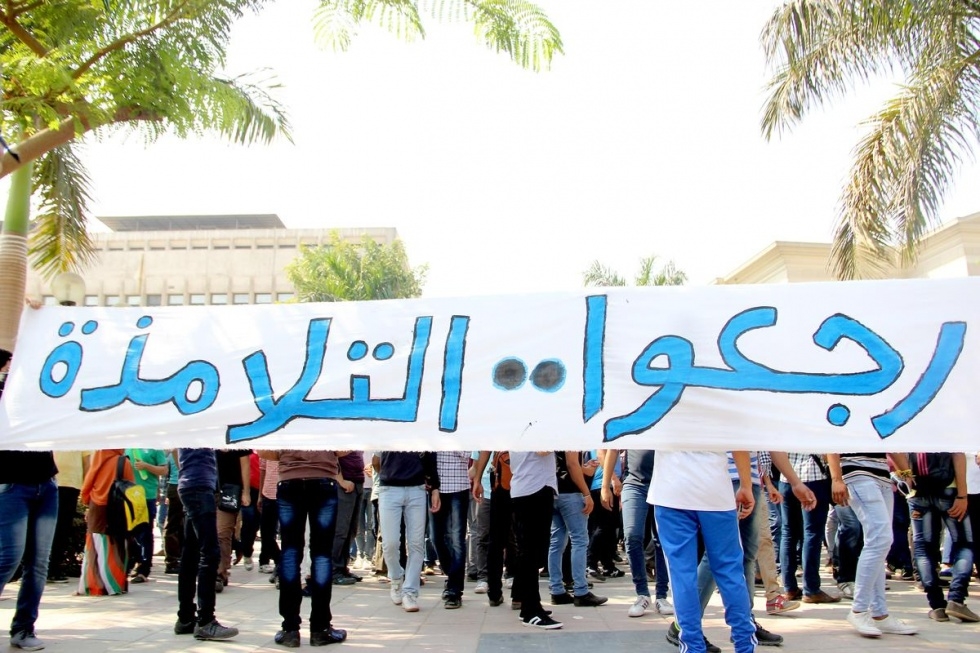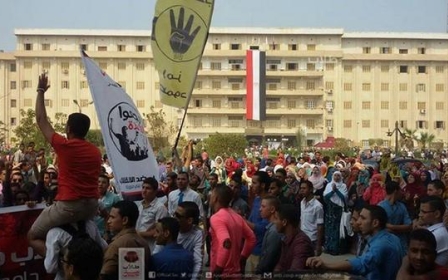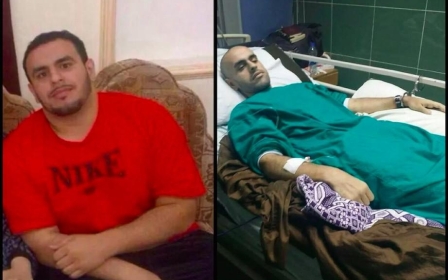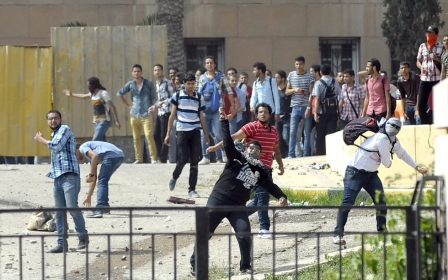Egyptian students launch 'back to university' anti-government campaign

Egypt’s public and private universities brace themselves for a new academic semester as students, youth groups and faculty members launch a fresh wave of anti-government protesters.
University students and faculty have planned protests against the overhaul of Egypt’s university polices, restricting political dissent and proposing stricter laws as a means to crackdown on on-campus demonstrators.
As university students began classes on Saturday, anti-government student movements launched ‘The Students are back’ campaign on Sunday which calls for an end to arbitrary political detentions. Twenty universities took part in to the nation-wide protests.
At least 13 people were arrested on Sunday during police raids at Cairo and al-Azhar Universities, where police fired tear gas and students broke down a security gate.
“Every day will be a bigger day of protests as more students join on-campus demonstrations against the military coup,” said Diaa Sawy, deputy head of Youth against the Coup, a group established after the ouster of President Mohamed Morsi on 3 July 2013.
Youth against the Coup is a student and youth led movement representing tens of Egyptian university students across the country who oppose the current government. The group has organised coordinated demonstrations inside university campuses since July 2013.
According to Sawy that the majority of Egypt’s students and youth groups are aligned to the wider anti-coup alliance of political parties in their call for the trying of Egyptian president Abdel-Fatah al-Sisi and interior minister Mohamed Ibrahim for their violent crackdown on protesters since the ouster of President Morsi in July 2013.
There are reportedly more than 20,000 political prisoners in Egyptian prisons who have been arbitrarily detained on charges of illegal demonstration.
A protest law was passed by the Egyptian government in November 2013 which bans protests without prior police notification. Human rights groups condemned the law which observers believe aims to restrict the activity of Muslim Brotherhood supporters.
While many news agencies reported that the protests which sparked across Egyptian universities on Sunday were mainly constituted of Muslim Brotherhood members and Islamist supporters, sources on the ground told MEE that the demonstrations were student and youth led and represented all sectors of society.
“If the protests end, everyone will think things are ok, but they are not,” said Ismail Hussein, a 22-year old accountancy student at Cairo’s Ain Shams University.
“We are finding it impossible to avoid clashes with police forces, they detain us haphazardly and use violence against us, while we are trying to use the most peaceful of tactics,” he added.
A security firm, Falcon which provides security services for 12 Egyptian universities, withdrew its staff from the Al-Azhar, Cairo and Ain Shams universities on Sunday as brief clashes erupted between students and police.
“[Falcon] is a militia which the government uses to clampdown on students on university campuses,” said Sawy.
“For the past year, tens of students have been killed daily,” he added.
The head of Fayoum University ordered an investigation into eight students accused of participating in campus protests on Sunday, Al-Ahram Arabic news website reported. The eight students being investigated face accusations of protesting without a permit and igniting fireworks on campus.
At a Sunday press conference, Higher Education Minister El-Sayed Abdel-Khalek said all students who protested at universities on Sunday had been filmed on CCTV, and would be expelled by the evening of the same day.
Parliamentary elections
While the Egyptian government has called on “active participation” in the upcoming parliamentary elections which are planned to take place before the end of the year, Egyptian student groups say they will boycott the vote.
“Any recognition of the parliamentary elections is an acceptance of the status quo,” Sawy told MEE.
“Those who took part in the 30 June protests have realised their mistake. The revolution is not done until we get rid of the military regime,” he added.
Observers have speculated a divide among opposition groups in Egypt as the parliamentary elections aimed to complete the roadmap after passing a new constitution in 2014, edge closer.
While the National Alliance for the Defence of Legitimacy, an alliance which consists of several opposition parties and considered ousted president Mohamed Morsi's main support bloc, oppose the elections, other political parties are opting to take part.
Leader of the Strong Egypt Party, Abdel Moneim Aboul Fotoh said in an interview with Egyptian daily Almasry Alyoum on 20 September that his party is preparing for the polls.
“We will take part in the elections on the condition that the current electoral law is amended so that it is in concurrence with the Constitutional principle of party diversity,” he said.
New MEE newsletter: Jerusalem Dispatch
Sign up to get the latest insights and analysis on Israel-Palestine, alongside Turkey Unpacked and other MEE newsletters
Middle East Eye delivers independent and unrivalled coverage and analysis of the Middle East, North Africa and beyond. To learn more about republishing this content and the associated fees, please fill out this form. More about MEE can be found here.




